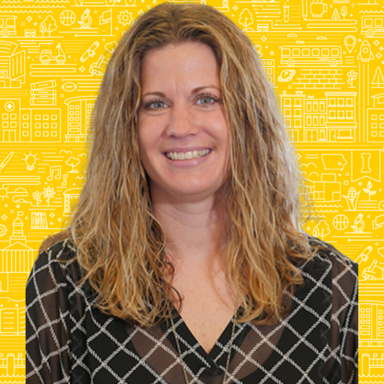
Emily Barnard, Assistant Dean of Health and Wellness, Counselor, Coe College
1. Please describe your role on campus.
I am the Assistant Dean of Health and Wellness and Counselor. I wear a lot of hats, working with health and wellness, including our health services, counseling service, and well-being promotion. As one of two licensed Social Workers, I carry a caseload of students and serve and lead committees on campus and within the community. I have a strong passion for combating stigma and bringing awareness to the importance of holistic well-being into our lives.
2. How do you lead and interface with mental health and well-being on your campus?
Constant and consistent education and awareness on how we can and need to embed health and wellbeing into every aspect of student, staff and faculty life. I lead trainings across campus, providing information, outreach, intervention, programming and holistic well-being education.
3. Would you share a story where you were concerned about something or someone, and the steps you took that either helped and/or left you considering how you would do it differently?
In my time at Coe, I’ve had a similar situation working with a student(s) who have dealt with a great deal of trauma, homelessness and food insecurity. Coming to Coe has/had been the most stable and safe environment they’ve had. I’ve had a few students over the years in this situation who unfortunately found that being a student AND unraveling years of trauma leads them unable to do both leading to missed classes, work, engaging in unhealthy coping, policy violations, failing grades and ultimately a lot of financial debt without any academic persistence to show.
We’ve had a few students who have been dismissed academically or through the conduct process, essentially leaving them ‘homeless’ as they lacked options to “go home.” I struggle greatly in these situations to know what we could do differently, what could I have done differently, or how we can help them obtain secure housing to hopefully break their cycle of homelessness, maladaptive behaviors and financial insecurity.
4. Could you tell us about one high point and one low point in your work?
High Point: One of the highest points was seeing a student show their perseverance and resiliency! Their first years were a long, bumpy ride, with multiple hospitalizations, suicide attempts, wellness checks, and security calls. Throughout all of it, they were not interested in services or support.
I sent messages throughout their year(s), encouraging and reminding them support services were here, when they were ready. When they were released from the hospital, they would meet with me, but not fully engage with services. At a last meeting before their return home, they shared a plan to end their life. With clear intent, access and plan, emergency contacts were contacted.
The following year, they came to my office (on their own!!) to let me know they were struggling with being on campus. While still ambivalent, they were contemplating therapy and (almost) ready to take those steps! We checked in more frequently, and while they were not where they wanted to be (yet), this was a highlight! We never know the impact of the seeds we plant. Keep showing up and doing the best you can, knowing our students are doing the best they can as well!
Low Point: The death of a student. As with any death, this rocked our community in ways I couldn’t fathom. Through the pain and grief, there was a lot of hurtfulness in the way our campus responded to administration and each other. Narratives and details about what happened spread via social media like wildfire, many of which were inaccurate. Within the counseling office, we knew details that could have quelled the inaccurate information, but due to confidentiality, we continued to respond to questions as we could and to support students. It was hard to navigate the countertransference we experienced, while supporting our hurting campus.
5. Is there something which you would like to normalize for others, where they may think they cannot share it?
Documentation and website management is the bane of my existence! I know the reasons we must document our work. When we are pulled into so many directions, meeting demands of higher caseloads and wearing many different hats, documentation is the thing I least enjoy in this work!
3 Self-Care Strategies Emily Swears By
- Have hobbies and interests and things that bring you joy OUTSIDE of your work. Move your body every day! I never used to be an early riser. Over the past several years, I find great solace in getting up early, and working out while it’s still dark. My absolute favorite and most peaceful time is while running early in the morning by moonlight.
- Take time to process the hard days, hard moments, and hard sessions before moving on to the next meeting, even if it’s a 60-second walk to the bathroom.
- Take time to recognize progress, as little as it may be both professionally and personally.